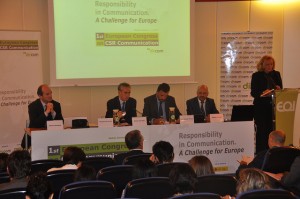Madrid Declaration on CSR Communication
EOI has welcomed, during the First European Congress about Communication on CSR, organized by DIRCOM, the presentation of the Madrid Declaration on CSR Communication. A European agreement, ratified by everyone at this congress, that lays the foundation for truthful, transparent and aligned with the overall business strategy CSR communication, and intends to be the guide of reference of good practices in this area.
Madrid Declaration on CSR Communication
Whereas
1. Corporate and institutional communication and public relations professionals nowadays play a key role in the long-term development strategy of organizations.
2. These professionals are responsible for their companies’ proper management of corporate reputation and all other intangible assets, which have a growing effect on the public’s perception of companies.
3. Financial, environmental and social Responsibility is an increasingly important element in the proper management and governance of a company.
4. Because of its deep implications onto reputation management and public affairs, Corporate Social Responsibility (CSR) policies need to be properly addressed in the light of a broader approach to both internal and external communication. CSR produces values acknowledged by the stakeholders, and it is therefore a corporate need for sustainability, differentiation and competitiveness.
5. Credible CSR policies need to foster a corporate behaviour sustained by coherent, transparent and measurable procedures.
Therefore,
The 1st European Congress on CSR Communication, meeting in Madrid from the 5th to the 7th of October, 2011, and gathering experts in CSR communication from European Union countries, taking into account Dircom’s Manifesto for a Responsible Society (2010), DECLARES
1. CSR and its communication must become an essential part of an organization’s corporate communication and public relations strategy.
2. Because CSR relates to communication more (and more decisively) than to any other single top level management area, many companies have deemed it reasonable to place CSR executives as reporting to the chief communication officer.
3. Where this is not possible, close co-operation should still exist between the departments responsible for CSR and communication, which must report directly to the CEO.
4. Communication of CSR should attain the highest possible standards of truth, accountability and transparency.
5. CSR should refer to corporate principles, values and behaviours, and should be communicated through internationally acknowledged standards in order to ease their urderstanding by the stakeholders.
6. Marketing, advertising or commercial campaigns making use of CSR-related information should be considered in the light of the company’s long-term reputation strategy prior to the launching of any such campaign.
7. CSR also applies to the communication and PR departments in their own tasks, and they should be particularly keen to interiorize the company’s CSR principles and strategies.
8. While governments should play a key role to help CSR spread in their countries’ business community, introduction of particular CSR policies should be a matter of each company’s decision making process. Otherwise, a company’s stakeholders and society at large would be unable to tell responsible companies from those who are not.
Given in Madrid on Oct. 7th, 2011.




.png)
].gif)
.png)
].png)
].png)
].png)
.png)
].png)
.png)
